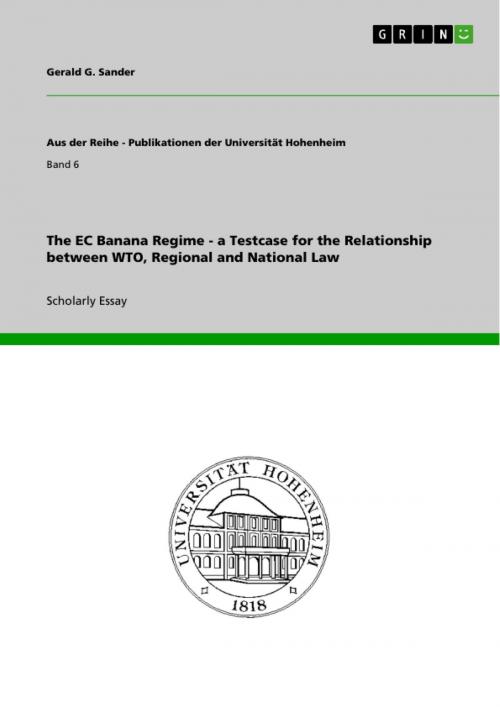The EC Banana Regime - a Testcase for the Relationship between WTO, Regional and National Law
a Testcase for the Relationship between WTO, Regional and National Law
Nonfiction, Reference & Language, Law, International| Author: | Gerald G. Sander | ISBN: | 9783638145770 |
| Publisher: | GRIN Publishing | Publication: | October 8, 2002 |
| Imprint: | GRIN Publishing | Language: | English |
| Author: | Gerald G. Sander |
| ISBN: | 9783638145770 |
| Publisher: | GRIN Publishing |
| Publication: | October 8, 2002 |
| Imprint: | GRIN Publishing |
| Language: | English |
Scientific Essay from the year 1998 in the subject Law - European and International Law, Intellectual Properties, University of Tubingen (Law), - entries in the bibliography, language: English, abstract: The creation of the internal market within the European Community (EC) made it necessary to integrate the differing national arrangements that were still existing by 1993 with regard to a variety of goods. One of these Community-wide regimes adopted is the EC banana regime. It is one of the most disputed regimes so far1 An import tax of 20 was in force in the open, free market economies of the Benelux, Ireland and Denmark before the EC banana regime came into force. Only in Germany was no import tax levied because of the Banana Protocol of 25 March 1957. Bananas from ACP countries could be imported into all EC countries as a matter of principal tax free pursuant to Art. 168 of the Lomé Convention IV. After 5 years of negotiation2 the common market organization for bananas came into force on 1 July 1993. The legal basis is the Council Regulation (EEC) 404/933, a brief summary of which follows. Its regime discriminates against banana producers who are not based in the EC or in countries of the African, Caribbean or Pacific area (ACP), and against companies that distribute bananas that originate in those countries. At present imports of bananas from twelve previously determined traditional ACP countries enter the Community duty free, up to a maximum quantity fixed for each country in the regulation. Non-traditional ACP and third-country imports are subject to a tariff quota which lies well below the quantity these countries exported to the EC before the new banana regime was introduced with an import tax of 100 ECU per tonne. Furthermore, out of quota shipments are subject to a prohibitive duty, which renders importation uneconomical, that is 750 ECU per tonne for imports from ACP states and 850 ECU per tonne for third country bananas. Licensing requirements are applied to imports of traditional as well as non-traditional ACP- and third countries. As a result of these regulations, operators who traditionally marketed third country bananas have a competitive disadvantage over those who marketed Community bananas.4 Licenses for importation of bananas from non-traditional ACP and third countries are issued to three market sharing groups. Accordingly the earlier importers of these bananas only receive a quota of 66.5%. [...]
Scientific Essay from the year 1998 in the subject Law - European and International Law, Intellectual Properties, University of Tubingen (Law), - entries in the bibliography, language: English, abstract: The creation of the internal market within the European Community (EC) made it necessary to integrate the differing national arrangements that were still existing by 1993 with regard to a variety of goods. One of these Community-wide regimes adopted is the EC banana regime. It is one of the most disputed regimes so far1 An import tax of 20 was in force in the open, free market economies of the Benelux, Ireland and Denmark before the EC banana regime came into force. Only in Germany was no import tax levied because of the Banana Protocol of 25 March 1957. Bananas from ACP countries could be imported into all EC countries as a matter of principal tax free pursuant to Art. 168 of the Lomé Convention IV. After 5 years of negotiation2 the common market organization for bananas came into force on 1 July 1993. The legal basis is the Council Regulation (EEC) 404/933, a brief summary of which follows. Its regime discriminates against banana producers who are not based in the EC or in countries of the African, Caribbean or Pacific area (ACP), and against companies that distribute bananas that originate in those countries. At present imports of bananas from twelve previously determined traditional ACP countries enter the Community duty free, up to a maximum quantity fixed for each country in the regulation. Non-traditional ACP and third-country imports are subject to a tariff quota which lies well below the quantity these countries exported to the EC before the new banana regime was introduced with an import tax of 100 ECU per tonne. Furthermore, out of quota shipments are subject to a prohibitive duty, which renders importation uneconomical, that is 750 ECU per tonne for imports from ACP states and 850 ECU per tonne for third country bananas. Licensing requirements are applied to imports of traditional as well as non-traditional ACP- and third countries. As a result of these regulations, operators who traditionally marketed third country bananas have a competitive disadvantage over those who marketed Community bananas.4 Licenses for importation of bananas from non-traditional ACP and third countries are issued to three market sharing groups. Accordingly the earlier importers of these bananas only receive a quota of 66.5%. [...]















